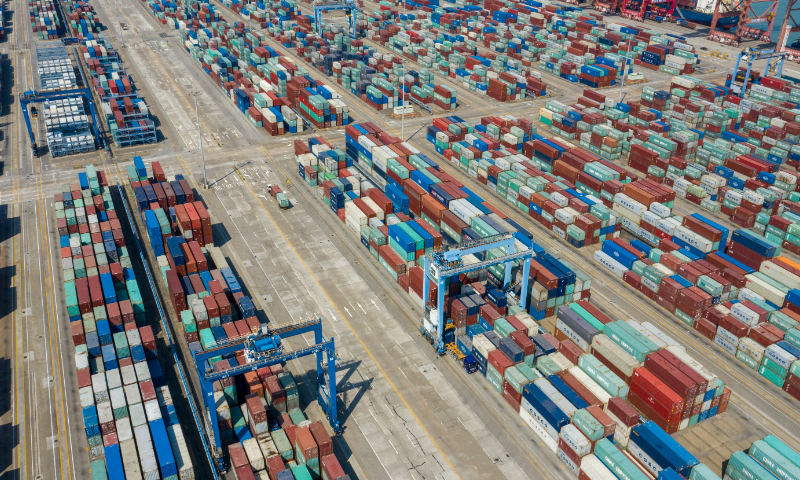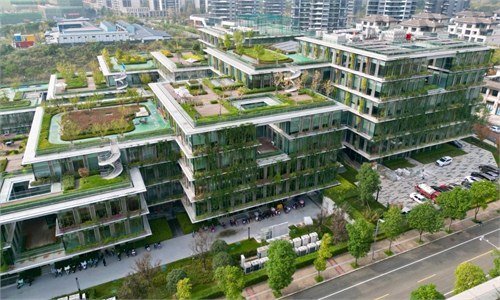
The photo taken on February 23, 2020 shows the Guangzhou Nansha Port. Photo: VCG
China kicked off a yearlong campaign on Tuesday, themed "Invest in China," a strong move to attract foreign investment and help foreign companies better understand China's opportunities, as the world's second-largest economy pursues wider opening-up amid rising external uncertainties.
The event, initiated and organized by the Ministry of Commerce, was officially launched in Guangzhou, South China's Guangdong Province, the nation's export hub, and it will last throughout the year. Special promotional events will also go overseas to Saudi Arabia, Japan and South Korea, as well as to Germany and other European countries.
For the rest of the year, over 20 activities will be held across the nation and abroad, to "help foreign investors understand China's investment environment more comprehensively, develop businesses, listen to their appeals, respond to their concerns, better serve everyone, and thus encourage them to invest in China," Vice Minister of Commerce Wang Shouwen, who is China International Trade Representative, said on Tuesday.
The strong effort to attract foreign investment comes at the conclusion of the three-day China Development Forum 2023 held in Beijing, during which top officials of the world's second-largest economy reassured participants - mostly multinational CEOs and representatives of global organizations - about China's further opening-up commitment and policy orientation this year and beyond.
"China's policy of utilizing foreign investment will not change, and it will make greater efforts to attract and utilize foreign investment. China's long-term fundamentals and resilient economy that is full of potential have not changed. The economy is obviously stabilizing and rebounding, with support policies being implemented in a strong and orderly manner, so it is the right time for foreign enterprises to expand their investment in China. We welcome you to seize the favorable opportunity and make long-term arrangements in China, and we believe that foreign enterprises will have better development prospects here," Vice Premier He Lifeng said at the inauguration event on Tuesday evening.
"In the next step, we will continue to smooth channels for coordination and communication between the government and foreign companies, continue to improve the complaint mechanism for foreign-invested enterprises, understand and advance through multiple channels, and actively promote the resolution of opinions and data from foreign companies," He said.
"If you encounter any problems in the investment operation and project process, you can report to us through various channels at any time, and we will make timely improvements," He added.
This event demonstrates the high priority that China places on opening up to foreign investments, and "we appreciate that very much," Markus Kamieth, a board member of BASF SE, said at the launch ceremony on Tuesday.
The senior executive stressed China's importance to the firm, especially for its high-quality products and solutions. "Despite the geopolitical uncertainties, we in BASF remain optimistic and committed to further developing in and with China - we are here for the long haul," Kamieth said.
"Our success in China is only possible with strong government support and effective policies for international investors, especially when it comes to sustainability and innovation," said the executive.
By the end of 2022, the cumulative number of foreign companies in China reached 1.126 million, with cumulative investment of 19.7 trillion yuan ($2.86 trillion), according to He, saying that while promoting the integration of China and the world economy, these foreign firms also ride on the fast train of China's development and achieve development of their own.
"From the perspective of enterprises, to invest in China is not only to invest in the present, but also in the future," He said.
Such an event is especially "necessary" to let foreign investors see the opportunities in the Chinese market when some foreign capital may show hesitance toward investment in China, under a complex international environment, geopolitical tensions and some countries' attempt to oust China from the global supply chain, Bai Ming, deputy director of the international market research institute at the Chinese Academy of International Trade and Economic Cooperation, told the Global Times on Tuesday.
"In terms of attracting foreign investment, I think we should first focus on large enterprises and improve the quality of foreign investment, which will have a similar demonstration effect on other companies," Bai said.
Though there have been reports that foreign investment has been moving to Southeast Asia, China's industrial support and well-matched cooperative enterprises are irreplaceable advantages, said the expert.
Foreign direct investment (FDI) into the mainland, in actual use, expanded 6.1 percent year-on-year to 268.44 billion yuan in the first two months of 2023. In US dollar terms, the FDI inflow went up 1 percent year-on-year to $39.71 billion.



